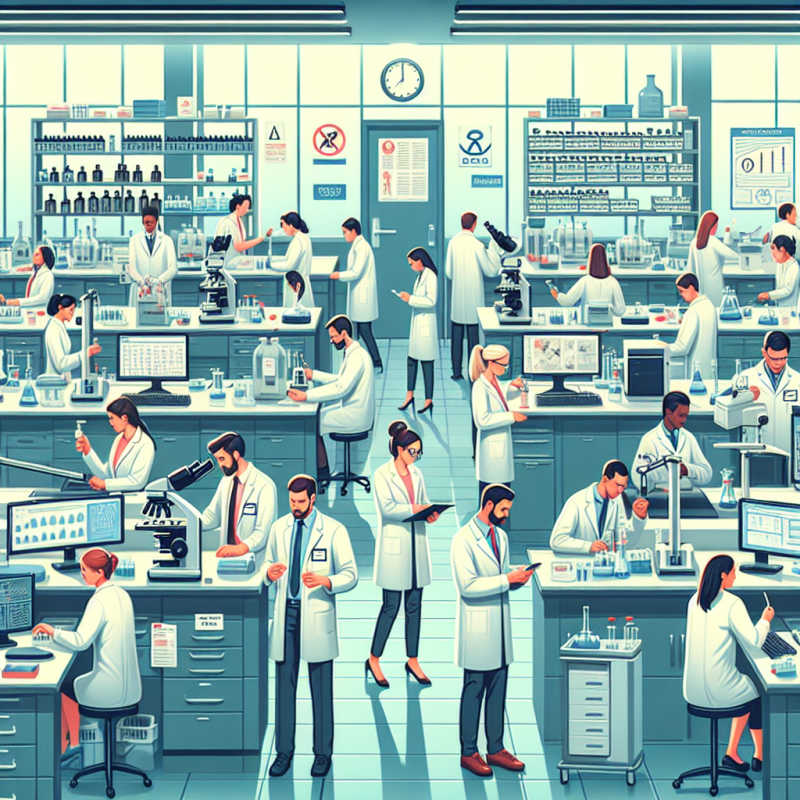Are you ready to embark on a rewarding journey in the pharmaceutical industry, but unsure where to start or how to advance? This comprehensive guide will illuminate the diverse career paths available, from entry-level positions like lab technicians and sales representatives to specialized roles such as pharmacovigilance officers and biostatisticians. We’ll delve into the qualifications and skills needed, the impact of technology on pharma careers, and the importance of regulatory and compliance roles. Additionally, we’ll explore global opportunities and provide practical tips to help you stand out in this dynamic field. Whether you’re just starting out or looking to climb the career ladder, our insights will equip you with the knowledge to navigate and thrive in the pharmaceutical industry.
Exploring Entry-Level Opportunities in Pharma
Jumping into the pharmaceutical industry can be a game-changer for your career. There are a plethora of entry-level roles that can set you on the path to success. Positions like lab technicians, sales representatives, and regulatory affairs assistants are in high demand. Companies such as Pfizer, Johnson & Johnson, and Novartis frequently seek fresh talent for these roles.
To land one of these coveted positions, you’ll need a mix of the right qualifications and skills. A degree in life sciences or chemistry is often a must for lab technicians, while sales roles may require a background in business or marketing. Regulatory affairs assistants benefit from knowledge in regulatory guidelines and compliance. Certifications like Certified Pharmaceutical Sales Representative (CPSR) or training programs in Good Laboratory Practice (GLP) can significantly boost your employability.
Standing out as a candidate involves more than just having the right credentials. Tailor your resume to highlight relevant internships or volunteer work. Networking is crucial; attend industry conferences and webinars to make connections. Showcasing a proactive attitude and a willingness to learn can make you a standout candidate in the competitive world of pharma jobs.
Advancing Your Career: Mid-Level Positions and Growth
So, you’ve got your foot in the door of the pharmaceutical industry, but what’s next? Advancing your career from entry-level to mid-level positions is where things get really interesting. Typical roles at this stage include project managers, clinical research associates, and quality assurance specialists. These positions not only come with more responsibilities but also offer a significant bump in salary. For instance, a clinical research associate can expect to earn between $60,000 and $90,000 annually, depending on experience and location.
Gaining experience is crucial, but don’t underestimate the power of additional education and certifications. Many mid-level professionals pursue advanced degrees or specialized certifications to stand out. Networking is another key component. Attend industry conferences, join professional organizations, and don’t be shy about reaching out to mentors. These connections can open doors to new opportunities and provide valuable insights into the industry. Remember, professional development is a continuous journey, and staying updated with the latest trends and technologies is essential for long-term success.
Specialized Roles in the Pharmaceutical Industry
The pharmaceutical industry is teeming with specialized roles that require unique qualifications and skills. Among these, pharmacovigilance officers, biostatisticians, and medical science liaisons stand out as critical positions. Pharmacovigilance officers are responsible for monitoring the safety of pharmaceutical products and ensuring compliance with regulatory requirements. They need a keen eye for detail and a strong understanding of pharmacology and regulatory affairs. Biostatisticians, on the other hand, focus on the application of statistics to biological fields, requiring expertise in data analysis and statistical software. Medical science liaisons act as the bridge between pharmaceutical companies and the medical community, necessitating excellent communication skills and a deep understanding of clinical research.
To give you a clearer picture, here’s a comparison table of the responsibilities and requirements for these specialized roles:
| Role | Responsibilities | Qualifications |
|---|---|---|
| Pharmacovigilance Officer | Monitor drug safety, report adverse effects, ensure regulatory compliance | Degree in Pharmacology or related field, attention to detail, regulatory knowledge |
| Biostatistician | Analyze biological data, design clinical trials, interpret statistical results | Degree in Statistics or Biostatistics, proficiency in statistical software, analytical skills |
| Medical Science Liaison | Communicate scientific information, build relationships with healthcare professionals, support clinical research | Advanced degree in Life Sciences, excellent communication skills, clinical research experience |
In the ever-evolving pharmaceutical industry, continuous learning and staying updated with industry trends are crucial. Professionals can transition into these specialized roles by gaining relevant experience, pursuing additional certifications, and networking within the industry. For instance, a clinical researcher might become a medical science liaison by leveraging their clinical experience and enhancing their communication skills. Similarly, a data analyst with a background in biology could transition into a biostatistician role by acquiring specialized training in biostatistics.
The Impact of Technology on Pharma Careers
The pharmaceutical industry is undergoing a technological revolution that’s reshaping career landscapes. Advancements in technology are creating new roles in bioinformatics, data analysis, and digital health. Professionals in these fields are leveraging big data and machine learning to drive drug development and enhance patient care. For instance, bioinformaticians are using genomic data to develop personalized medicine, while data analysts are optimizing clinical trials through predictive analytics.
To thrive in these tech-focused pharma roles, you’ll need a blend of technical skills and pharmaceutical knowledge. Proficiency in programming languages like Python or R, and familiarity with biostatistics and data visualization tools are crucial. Additionally, understanding regulatory requirements and ethical considerations in digital health is essential. Looking ahead, the future of pharma careers will be dominated by AI-driven drug discovery, telemedicine, and wearable health tech. Staying updated with these trends and continuously upgrading your skills will be key to staying relevant in this ever-evolving industry.
Navigating Regulatory and Compliance Careers
In the pharmaceutical industry, regulatory and compliance roles are absolutely crucial. These positions ensure that companies adhere to government regulations and maintain the highest standards of quality control. Professionals in this field, such as regulatory affairs specialists, compliance officers, and quality control analysts, play a vital role in safeguarding public health by ensuring that products are safe and effective.
To excel in these roles, a strong educational background is essential. Typically, a degree in pharmacy, chemistry, or biological sciences is required, along with specialized certifications like Regulatory Affairs Certification (RAC). These qualifications equip professionals to tackle complex regulatory challenges, such as navigating the FDA approval process or ensuring compliance with international standards.
- Regulatory Affairs Specialists: Focus on obtaining and maintaining product approvals.
- Compliance Officers: Ensure that all operations adhere to legal and ethical standards.
- Quality Control Analysts: Monitor product quality and implement testing protocols.
The career outlook in regulatory and compliance fields is promising, with increasing demand for skilled professionals. As regulations evolve and new products are developed, the need for experts who can navigate these complexities will only grow. This makes it a dynamic and rewarding career path for those interested in the intersection of science, law, and public health.
Global Opportunities in the Pharmaceutical Industry
The pharmaceutical industry is a vast, interconnected web that spans the globe, offering a plethora of opportunities for professionals willing to explore beyond their borders. From clinical trial managers to international sales directors, the demand for skilled individuals is ever-growing. Major pharmaceutical hubs like Basel, Switzerland; Cambridge, UK; and Boston, USA, are bustling with activity and innovation. These cities are not just centers of research but also offer a vibrant professional community and numerous career advancement opportunities.
Working in different countries comes with its own set of benefits and challenges. On the plus side, you get to experience diverse cultures, broaden your professional network, and often enjoy higher salaries. However, adapting to new environments, overcoming language barriers, and understanding different regulatory landscapes can be daunting. To successfully pursue a global career in pharma, it’s crucial to develop language skills and cultural adaptability. For instance, a clinical trial manager fluent in both English and Mandarin will find it easier to navigate the pharmaceutical landscapes of both the USA and China.
Case studies highlight the importance of these skills. Take the example of Jane Doe, an international sales director who leveraged her fluency in Spanish and deep understanding of Latin American markets to boost her company’s sales by 30% in the region. Her success underscores the value of being culturally and linguistically adaptable in the global pharmaceutical industry.
Frequently Asked Questions
- The most in-demand skills in the pharmaceutical industry include data analysis, regulatory knowledge, clinical research expertise, project management, and proficiency in digital health technologies. Soft skills like communication, problem-solving, and adaptability are also highly valued.
- Gaining experience can start with internships, co-op programs, or entry-level positions such as lab technicians or sales representatives. Volunteering for research projects, attending industry conferences, and networking with professionals can also provide valuable exposure and experience.
- Certifications such as the Regulatory Affairs Certification (RAC) from the Regulatory Affairs Professionals Society (RAPS) are highly beneficial. Other relevant certifications include Certified Clinical Research Professional (CCRP) and certifications in Good Clinical Practice (GCP).
- Networking is crucial in the pharmaceutical industry as it helps professionals stay informed about job opportunities, industry trends, and best practices. Joining professional organizations, attending industry conferences, and participating in online forums can significantly enhance career prospects.
- Yes, there are increasing opportunities for remote work in the pharmaceutical industry, especially in roles related to data analysis, regulatory affairs, medical writing, and digital health. The COVID-19 pandemic has accelerated the adoption of remote work practices across the industry.




